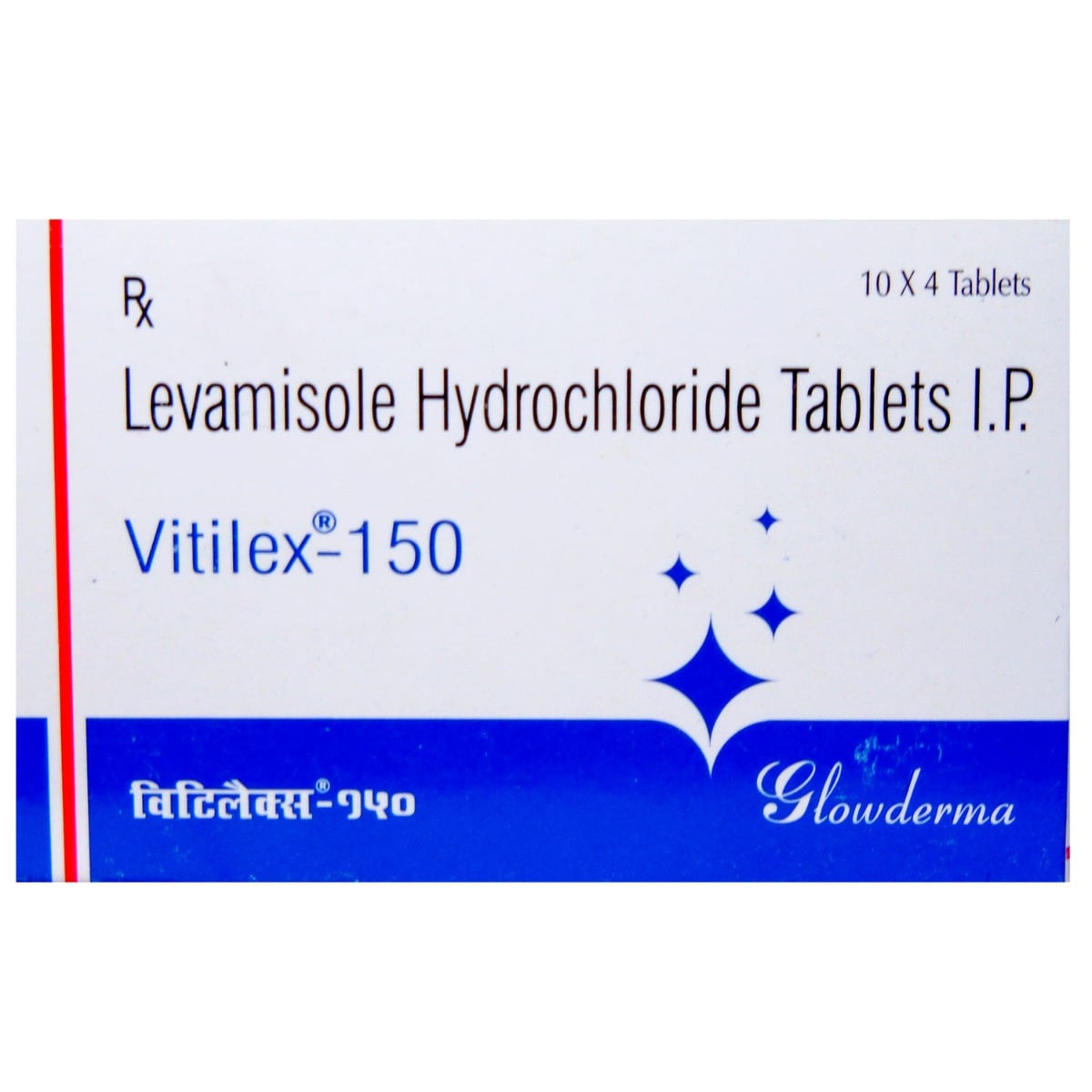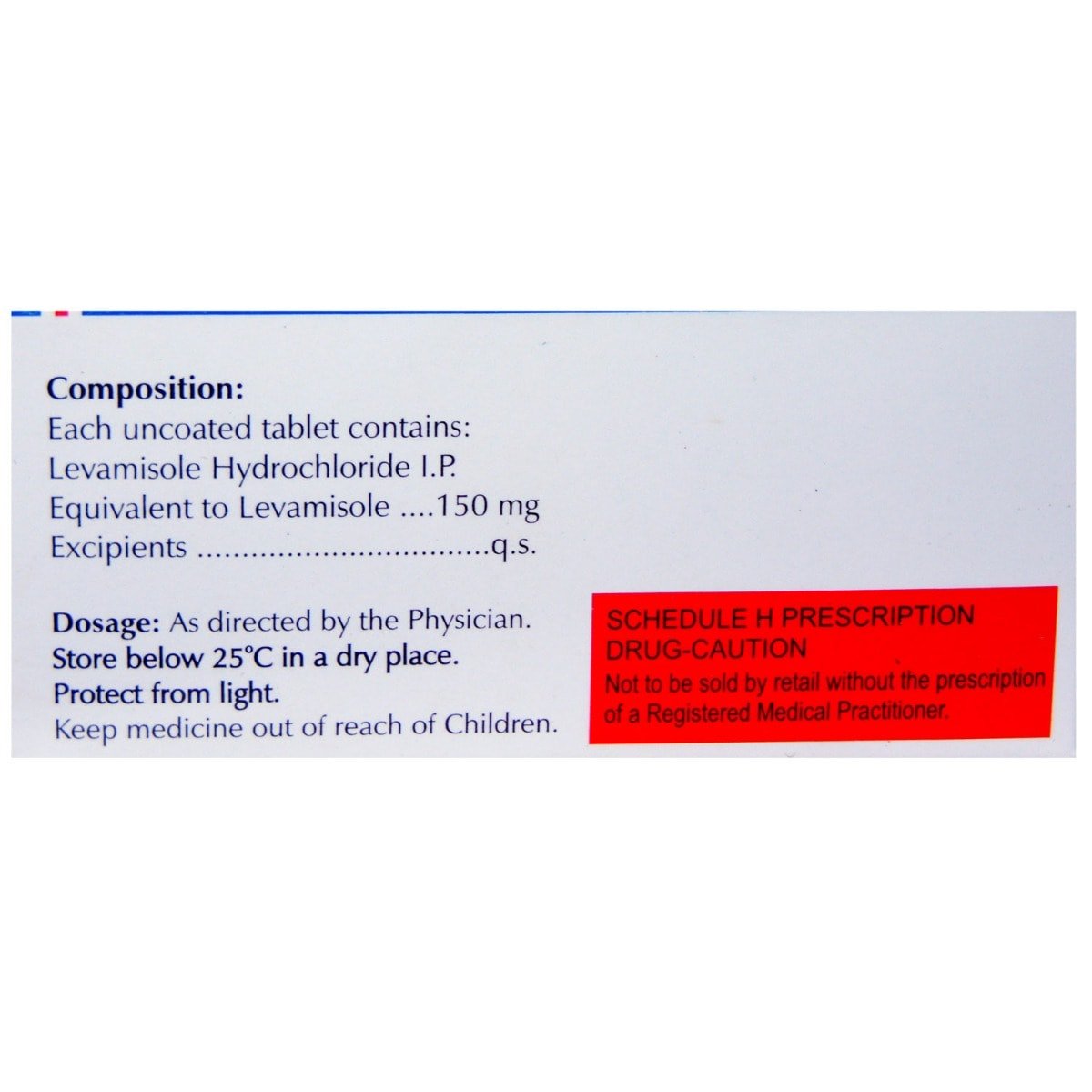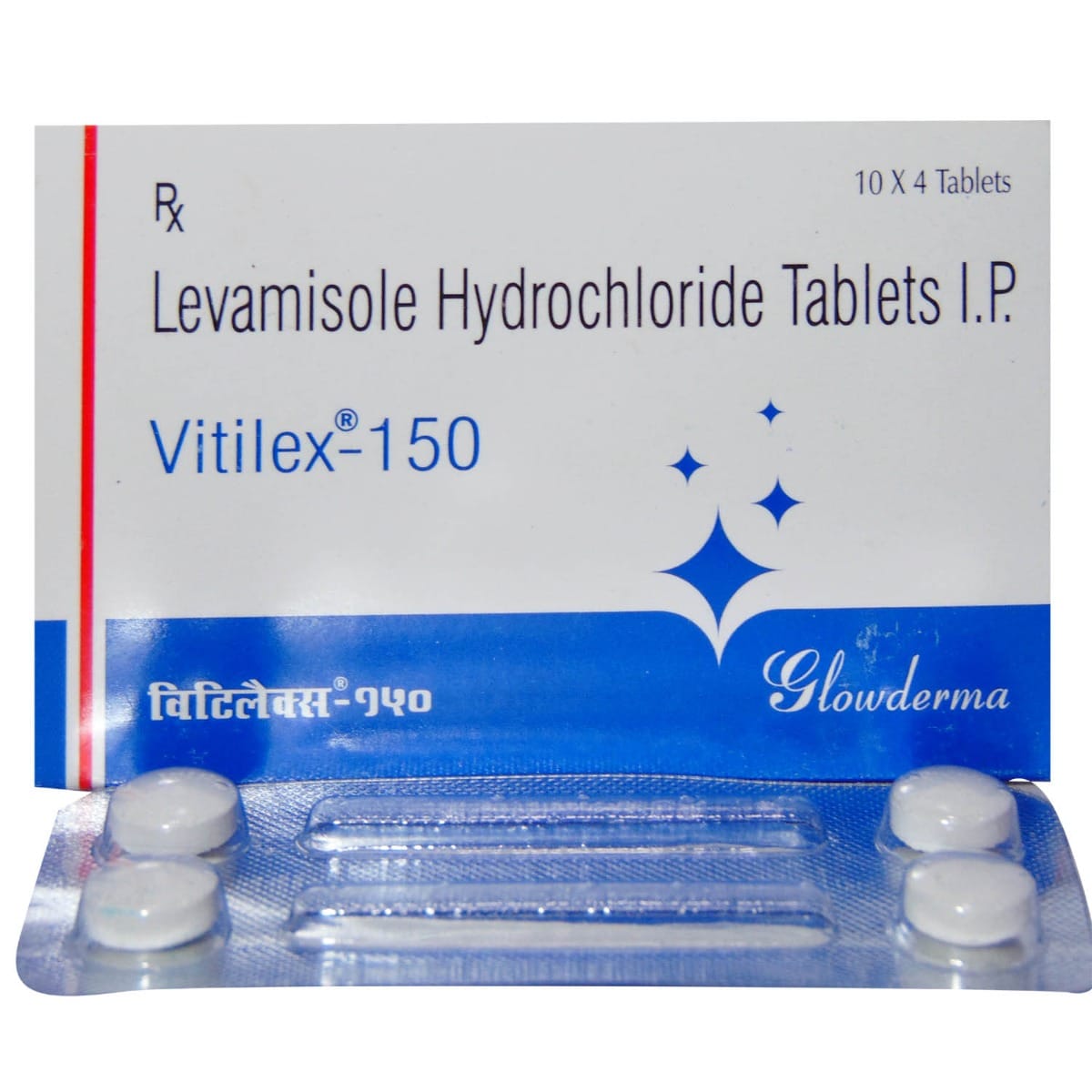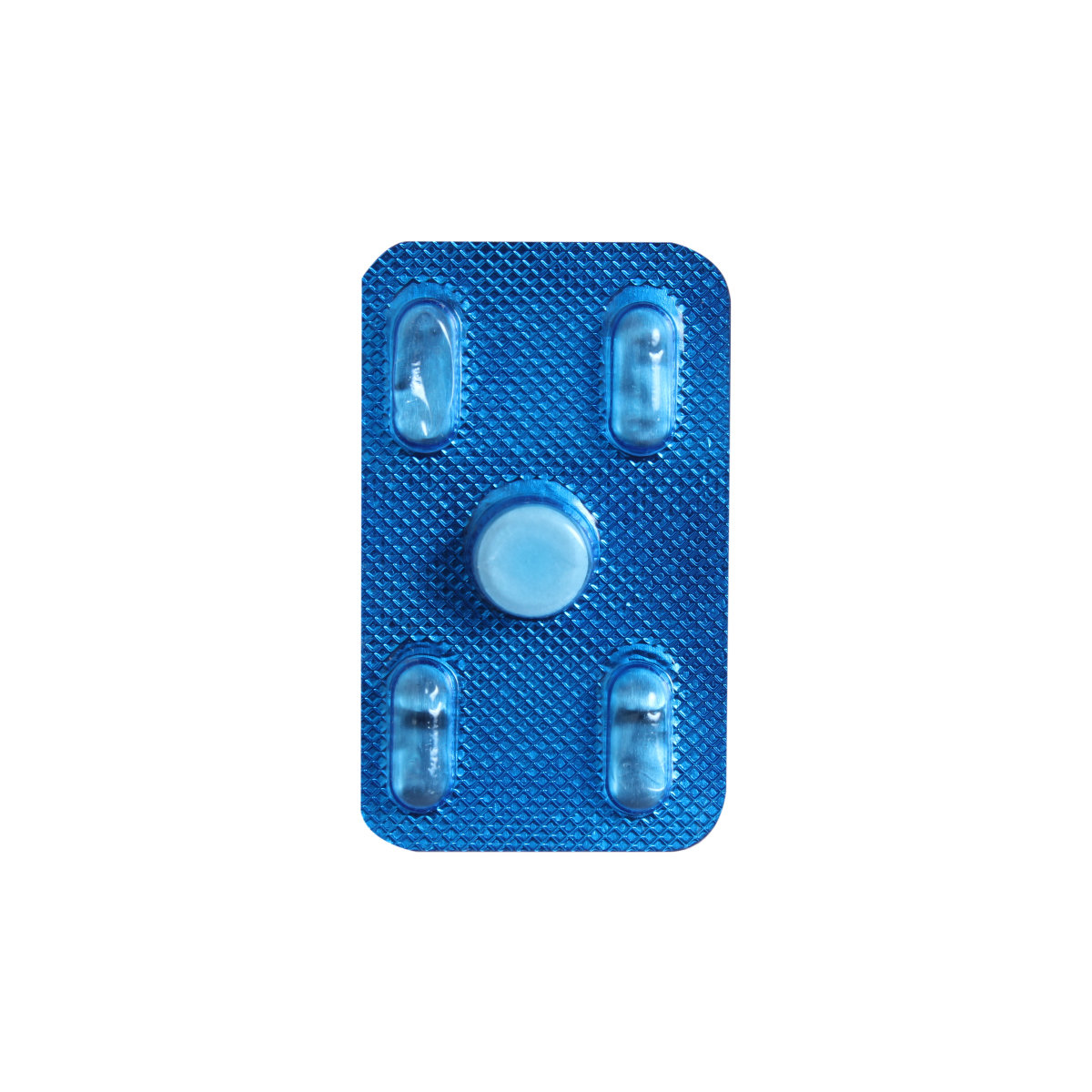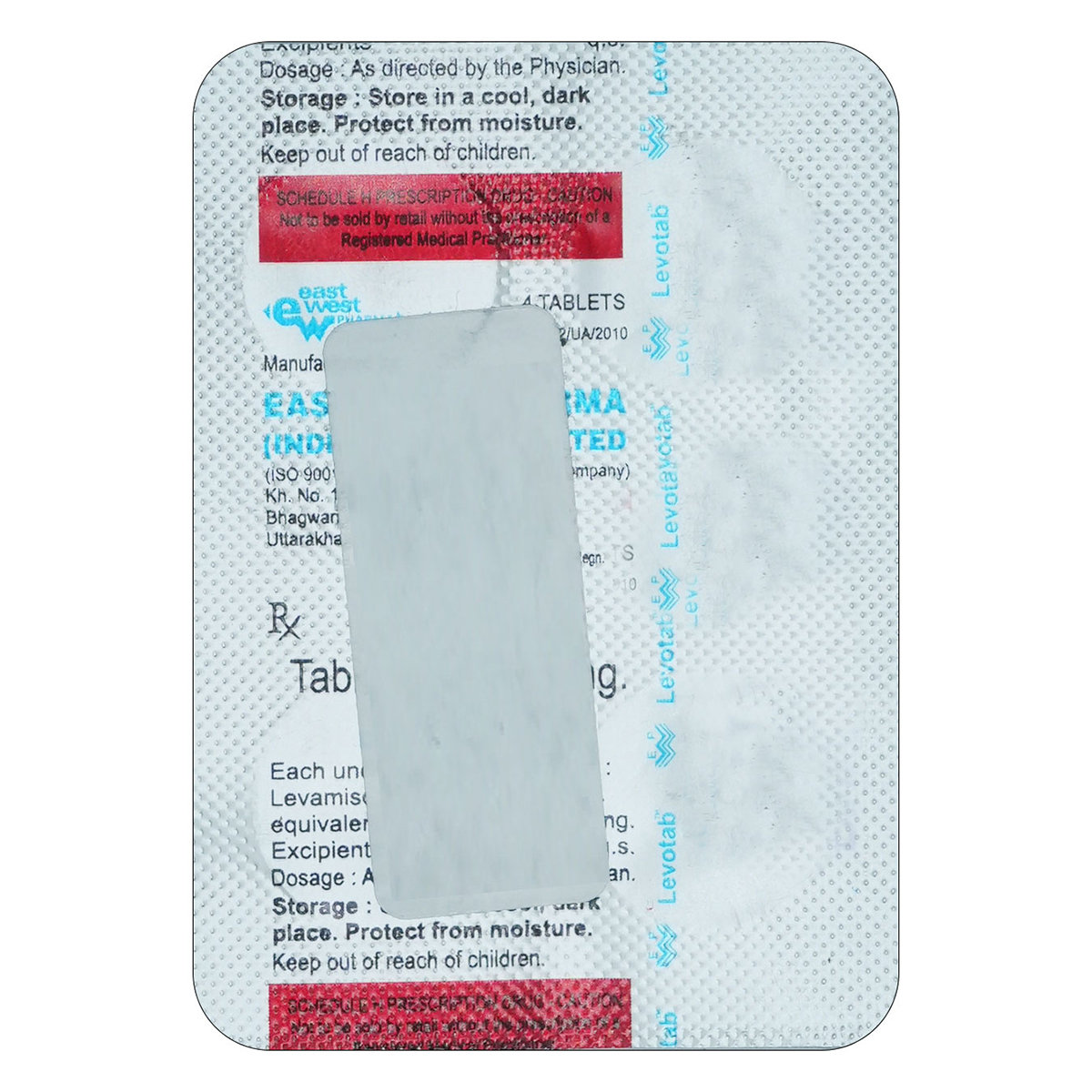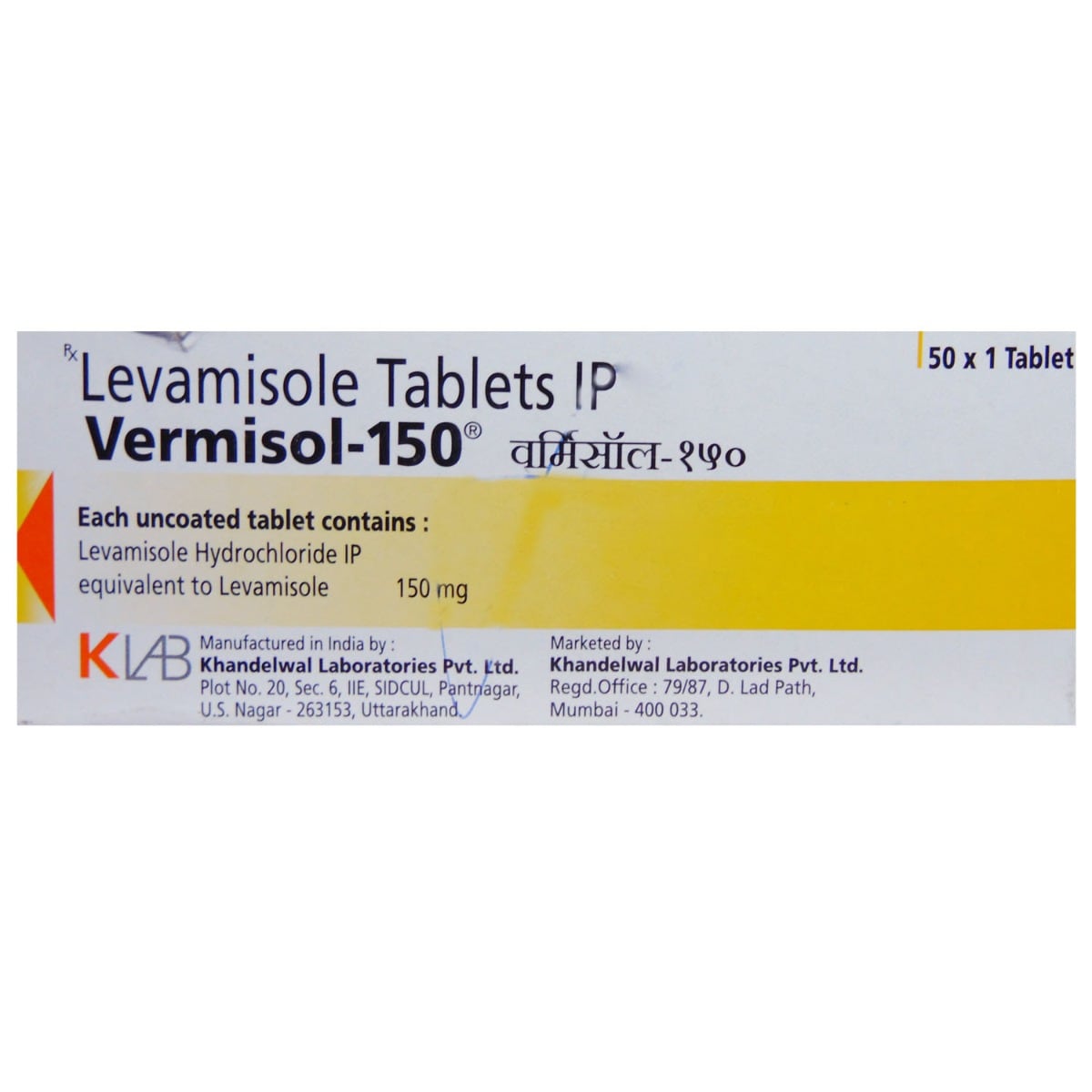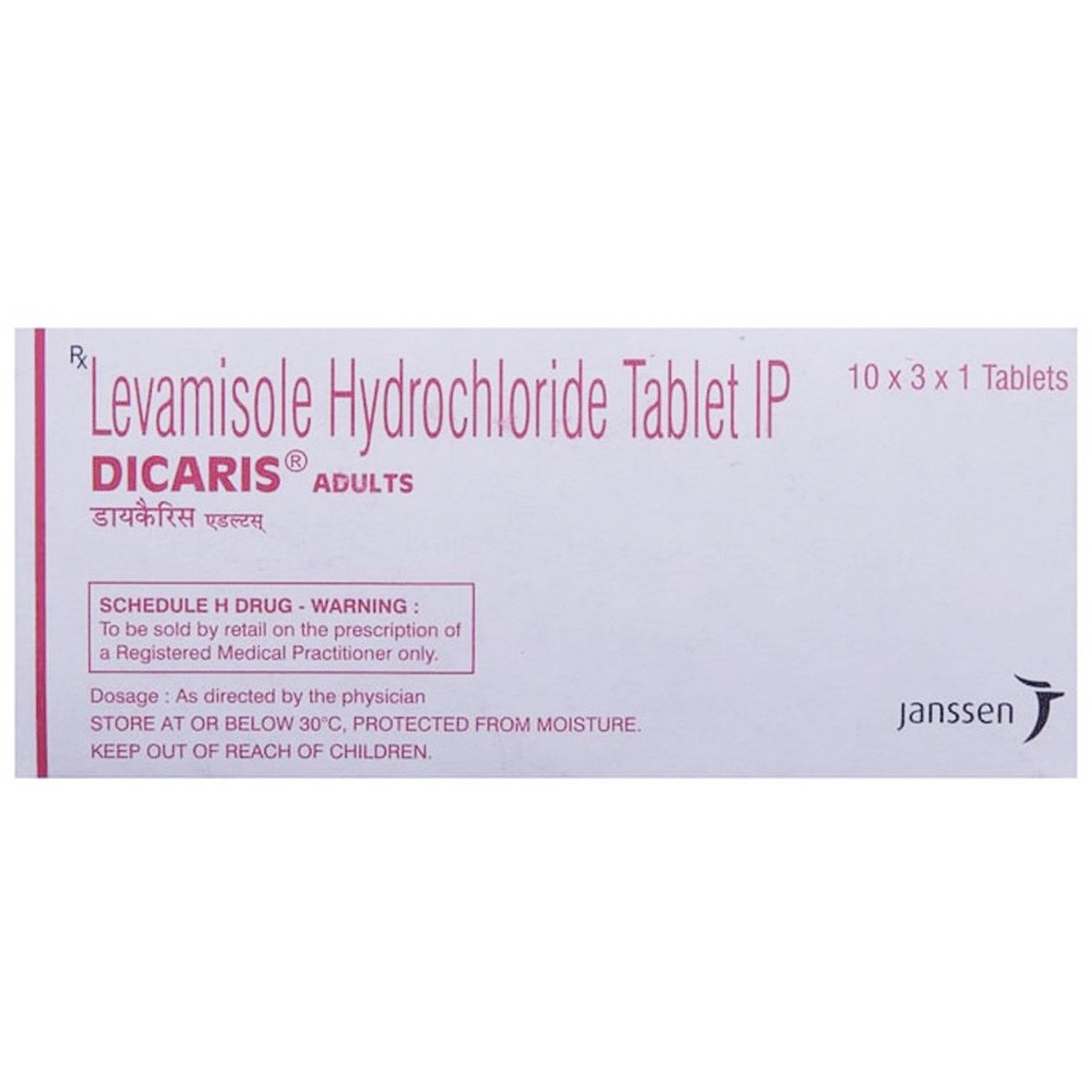Vitilex- 150 Tablet 4's
MRP ₹119
(Inclusive of all Taxes)
₹17.9 Cashback (15%)
Provide Delivery Location
Online payment accepted
 Prescription drug
Prescription drugWhats That
Composition :
Manufacturer/Marketer :
Consume Type :
Expires on or after :
Return Policy :
About Vitilex- 150 Tablet
Vitilex- 150 Tablet belongs to a class 'anti-parasitic', primarily used for the treatment of roundworm and hookworm infections. Roundworms are parasites that live in your intestine and cause ascariasis (an infection of the small intestine caused by Ascaris lumbricoides, which is a species of roundworm), and it also causes infection in the lungs. Hookworms are parasites; they live on other living things and cause ancylostomiasis (an infection of the small intestine caused by ancylostoma, a hookworm species), and it also causes infection in the lungs and skin.
Vitilex- 150 Tablet is composed of 'levamisole'. It works by suppressing the enzyme activity in the worm's muscle; this leads to paralysis and death. In this way, it kills worms and treats your infection.
You are advised to take Vitilex- 150 Tablet for as long as your doctor has prescribed it for you, depending upon your medical condition. The most common side effects of a Vitilex- 150 Tablet include headache, dizziness, vomiting, nausea, and abdominal pain. These side effects resolve on their own. However, if the side effects are persistent, stop the medicine and consult your doctor immediately.
Before starting Vitilex- 150 Tablet inform your doctor if you are allergic to Vitilex- 150 Tablet or any other medications. Inform your doctor if you are taking any prescription or nonprescription medications, herbal or dietary supplements. Use the Vitilex- 150 Tablet as advised by your doctor. Tell your doctor if you are pregnant or planning to get pregnant or breastfeeding. Do not recommend the Vitilex- 150 Tablet to kidney disease, liver disease and pre-existing blood disorders.
Uses of Vitilex- 150 Tablet
Directions for Use
Key Benefits
Vitilex- 150 Tablet is composed of 'levamisole' belonging to a class 'anti-parasitic', primarily used for treating roundworm and hookworm infections. It works by suppressing the enzyme activity in the worm's muscle; this leads to paralysis and death. In this way, it kills worms and treats your infection. Vitilex- 150 Tablet is also used in the treatment of mixed ascariasis hookworm infections. It is also used in colon cancer in combination with cancer medicine to work effectively against colon cancer.
Storage
- Inform your doctor about the nausea and discuss possible alternatives to the medication or adjustments to the dosage.
- Divide your daily food intake into smaller, more frequent meals to reduce nausea.
- Opt for bland, easily digestible foods like crackers, toast, plain rice, bananas, and applesauce.
- Avoid certain foods that can trigger nausea, such as fatty, greasy, spicy, and smelly foods.
- Drink plenty of fluids, such as water, clear broth, or electrolyte-rich beverages like coconut water or sports drinks.
- Use ginger (tea, ale, or candies) to help relieve nausea.
- Get adequate rest and also avoid strenuous activities that can worsen nausea.
- Talk to your doctor about taking anti-nausea medication if your nausea is severe.
- Record when your nausea occurs, what triggers it, and what provides relief to help you identify patterns and manage your symptoms more effectively.
- Inform Your Doctor: Notify your doctor immediately about your diarrhoea symptoms. This allows them to adjust your medication or provide guidance on managing side effects.
- Stay Hydrated: Drink plenty of fluids to replace lost water and electrolytes. Choose water, clear broth, and electrolyte-rich drinks. Avoid carbonated or caffeinated beverages to effectively rehydrate your body.
- Follow a Bland Diet: Eat easy-to-digest foods to help firm up your stool and settle your stomach. Try incorporating bananas, rice, applesauce, toast, plain crackers, and boiled vegetables into your diet.
- Avoid Trigger Foods: Steer clear of foods that can worsen diarrhoea, such as spicy, fatty, or greasy foods, high-fibre foods, and dairy products (especially if you're lactose intolerant).
- Practice Good Hygiene: Maintain good hygiene to prevent the spread of infection. To stay healthy, wash your hands frequently, clean and disinfect surfaces regularly, and avoid exchanging personal belongings with others.
- Take Anti-Diarrheal Medications: If your doctor advises, anti-diarrheal medications such as loperamide might help manage diarrhoea symptoms. Always follow your doctor's directions.
- Keep track of your diarrhoea symptoms. If they don't get better or worse or are accompanied by severe stomach pain, blood, or dehydration signs (like extreme thirst or dark urine), seek medical help.
- Rest well; get enough sleep.
- Eat a balanced diet and drink enough water.
- Manage stress with yoga and meditation.
- Limit alcohol and caffeine.
- Physical activities like walking or jogging might help boost energy and make you feel less tired.
- Inform your doctor immediately if you experience a fever after starting a new medication.
- Your doctor may adjust your medication regimen or dosage as needed to minimize fever symptoms.
- Monitor your body temperature to monitor fever progression.
- Drink plenty of fluids, such as water or electrolyte-rich beverages, to help your body regulate temperature.
- Get plenty of rest and engage in relaxation techniques, such as deep breathing or meditation, to help manage fever symptoms.
- Under the guidance of your doctor, consider taking medication, such as acetaminophen or ibuprofen, to help reduce fever.
- If your fever is extremely high (over 103°F), or if you experience severe symptoms such as confusion, seizures, or difficulty breathing, seek immediate medical attention.
- To increase your body temperature, take a soothing shower or soak in a warm bath.
- Avoid cold foods and beverages since they can cause your body temperature to drop even more.
- Stay indoors when it's cold, especially if you're feeling unwell.
- Consult your doctor if your chills continue, get worse, or are accompanied by other unusual symptoms.
- Preventing Vomiting (Before it Happens)
- Take medication exactly as prescribed by your doctor. This can help minimize side effects, including vomiting.
- Having a small meal before taking your medication can help reduce nausea and vomiting.
- Talk to your doctor about taking anti-nausea medication along with your prescribed medication.
- Managing Vomiting (If it Happens)
- Try taking ginger in the form of tea, ale, or candy to help alleviate nausea and vomiting.
- What to Do if Vomiting Persists
- Consult your doctor if vomiting continues or worsens, consult the doctor for guidance on adjusting your medication or additional treatment.
Drug Warnings
Before starting Vitilex- 150 Tablet inform your doctor if you are allergic to Vitilex- 150 Tablet or any other medications. Inform your doctor if you are taking any prescription or nonprescription medications, herbal or dietary supplements. Use the Vitilex- 150 Tablet as advised by your doctor. Tell your doctor if you are pregnant or planning to get pregnant or breastfeeding. Do not recommend the Vitilex- 150 Tablet to kidney disease, liver disease and pre-existing blood disorders. This Vitilex- 150 Tablet should be used with caution in patients with a history of liver diseases, kidney diseases due to the increased risk of severe adverse effects. Vitilex- 150 Tablet is also not recommended in rheumatoid arthritis. Caution should be taken while using Vitilex- 150 Tablet in Sjogren's syndrome ( disorder of your immune system identified by its two most common symptoms — dry eyes and a dry mouth).
Drug-Drug Interactions
Drug-Drug Interactions
Login/Sign Up
When Tofacitinib and Vitilex- 150 Tablet are used together, there is a higher chance of getting serious infections.
How to manage the interaction:
Although taking Vitilex- 150 Tablet and Tofacitinib together can evidently cause an interaction, it can be taken if your doctor has suggested it. If you notice any of these symptoms - infection, fever, chills, diarrhea, sore throat, muscle aches, shortness of breath, weight loss, pain or burning during urination - contact your doctor right away. Do not stop using any medications without first talking to your doctor.
Taking Vitilex- 150 Tablet together with certolizumab may increase the risk of serious infections.
How to manage the interaction:
Although Vitilex- 150 Tablet, together with certolizumab, can possibly result in an interaction, they can be taken together if advised by your doctor. However, contact a doctor if you experience any symptoms of infection, such as fever, chills, diarrhoea, sore throat, muscle aches, shortness of breath, blood in phlegm, weight loss, red or irritated skin, body sores, discomfort or burning during urination. Do not stop taking any medications without consulting a doctor.
When cladribine and Vitilex- 150 Tablet are used together, there is a higher chance of getting serious infections.
How to manage the interaction:
There may be a possibility of interaction between Vitilex- 150 Tablet and Leflunomide, but it can be taken if prescribed by a doctor. If you have any of these symptoms - infection, complications, fever, chills, diarrhea, sore throat, muscle aches, shortness of breath, weight loss, pain or burning during urination - contact your doctor right away. Do not stop using any medications without a doctor's advice.
Deferiprone can lower white blood cell count, and combining it with other medications like Vitilex- 150 Tablet can also affect white blood cells or bone marrow function, may increase the risk. You may be more likely to develop serious infections.
How to manage the interaction:
Taking Vitilex- 150 Tablet with Deferiprone together can result in an interaction, but they can be taken together if your doctor advises. However, contact a doctor if you experience any symptoms of infection, such as fever, chills, diarrhoea, sore throat, muscle aches, shortness of breath, blood in phlegm, weight loss, red or irritated skin, body sores, discomfort or burning during urination. Do not stop taking any medications without consulting a doctor.
Taking etanercept together with Vitilex- 150 Tablet may increase the risk of serious infections.
How to manage the interaction:
Although using etanercept together with Vitilex- 150 Tablet can result in an interaction, they can be taken together if advised by a doctor. However, contact a doctor if you experience fever, chills, diarrhea, sore throat, muscle aches, shortness of breath, blood in phlegm, weight loss, red or irritated skin, body sores, discomfort or burning during urination. Do not stop taking any medications without consulting a doctor.
Coadministration of baricitinib and Vitilex- 150 Tablet can raise the risk of developing serious infections.
How to manage the interaction:
Although there is an interaction, baricitinib can be taken with Vitilex- 150 Tablet if prescribed by the doctor. However, if you experience fever, chills, diarrhea, sore throat, muscle aches, shortness of breath, blood in your coughing fluid, weight loss, red or irritated skin, body sores, and discomfort or burning when you urinate, consult a doctor. Do not stop using any medications without talking to a doctor.
Combining adalimumab with Vitilex- 150 Tablet can make you more likely to get severe infections.
How to manage the interaction:
There may be a possibility of interaction between Vitilex- 150 Tablet and Adalimumab, but it can be taken if prescribed by a doctor. If you experience fever, chills, diarrhea, a sore throat, muscle pain, difficulty breathing, losing weight, pain or burning when you urinate contact your doctor immediately. Do not stop using any medications without first talking to your doctor.
Taking fingolimod together with Vitilex- 150 Tablet may increase the risk of infections.
How to manage the interaction:
Although using fingolimod together with Vitilex- 150 Tablet can possibly result in an interaction, they can be taken together if advised by your doctor. However, contact a doctor if you experience any symptoms of infection, such as fever, chills, diarrhoea, sore throat, muscle aches, shortness of breath, blood in phlegm, weight loss, red or irritated skin, body sores, discomfort or burning during urination. Do not stop taking any medications without consulting a doctor.
Taking Vitilex- 150 Tablet and rotavirus vaccine together increases the risk of infection and also decreases the efficacy of the vaccine.
How to manage the interaction:
Although taking Vitilex- 150 Tablet and Rotavirus vaccine together can possibly result in an interaction, they can be taken together if prescribed by a doctor. However, contact a doctor if you experience any symptoms of infection, such as fever, chills, diarrhoea, sore throat, muscle aches, shortness of breath, blood in phlegm, weight loss, red or irritated skin, body sores, discomfort or burning during urination. Do not stop taking any medications without consulting a doctor.
Taking Vitilex- 150 Tablet together with golimumab may increase the risk of serious infections.
How to manage the interaction:
Although using Vitilex- 150 Tablet together with golimumab can possibly result in an interaction, they can be taken together if advised by your doctor. However, contact a doctor if you experience any symptoms of infection, such as fever, chills, diarrhoea, sore throat, muscle aches, shortness of breath, blood in phlegm, weight loss, red or irritated skin, body sores, discomfort or burning during urination. Do not stop taking any medications without consulting a doctor.
Drug-Food Interactions
Drug-Food Interactions
Login/Sign Up
Diet & Lifestyle Advise
- Wash your hands with soap and water before handling food.
- Teach children the importance of washing hands to prevent infection.
- Wash, peel or cook all raw vegetables and fruits before eating, particularly those that have been grown in soil that has been fertilized with manure.
- Take milk, papaya, nuts, oats, eggs into your regular diet.
- Eat berries, fish, veggies.
- Avoid oily food and spicy foods.
Side Effects of Vitilex- 150 Tablet
- Vomiting
- Headache
- Dizziness
- Nausea
- Abdominal pain
- Mouth sores
- Loss of appetite
- Stomach pain
- Change in taste and smell
- Muscle aches
- Fatigue
- Skin rash
Habit Forming
Therapeutic Class
All Substitutes & Brand Comparisons
RX
Out of StockAnthelnil 150mg Tablet
₹50
(₹4.5 per unit)
83% CHEAPERRX
Out of StockLeris 150mg Tablet
₹10
(₹4.5 per unit)
83% CHEAPERRX
Out of StockLeesol 150mg Tablet
₹100
(₹9.0 per unit)
66% CHEAPER
Drug-Diseases Interactions
Drug-Diseases Interactions
Login/Sign Up
FAQs
Drug-Drug Interactions Checker List
- IVERMECTIN
- CAPECITABINE
- WARFARIN
- ALBENDAZOLE
- PHENYTOIN
- ALCOHOL
- DOXIFLURIDINE
Special Advise
- Do not skip doses and finish the prescribed course, even if you start to feel better. Stopping it early may increase your risk of further infection.
- Avoid being near people who are sick or have infections. Inform your doctor if you develop signs of infection.
- Monitor your blood counts and liver function before you start taking this medicine and regularly throughout your treatment.
Disease/Condition Glossary
Roundworms: Roundworms are parasites that live in your intestine. They are contagious through contact with the infected stool of people or animals. Roundworms can also be contracted by contact with infected surfaces (usually soil and dirt). It causes ascariasis, an small intestine infection caused by Ascaris lumbricoides, a roundworm species. Mostly it is transmitted through poor hygiene. It is usually found in human faeces and is transmitted from hand to mouth. Symptoms include live worm in your stool, wheezing, cough, fever, severe abdominal pain, vomiting, restlessness, disturbed sleep, weight loss, and loss of appetite. Sometimes it also affects the lungs; symptoms include coughing, wheezing, chest discomfort, fever and blood in the mucus.
Hookworms: Hookworms are parasites. This means they live on other living things. Hookworms affect your lungs, skin, and small intestine. Hookworm causes ancylostomiasis, an infection of the small intestine that is caused by Ancylostoma hookworm. Hookworm is passed by human faeces onto the ground. It is transmitted by walking barefoot on contaminated soil or by the ingestion of contaminated food/by directly passing through the skin. Symptoms include diarrhoea, barely noticeable abdominal pain, intestinal cramps, colic, nausea and serious anaemia. People in good health may not have any symptoms at all.
Mixed Ascariasis-Hookworm infections: There are mixed infections caused by Ascaris lumbricoides (giant roundworms) and hookworms.

Have a query?
Alcohol
Safe if prescribed
Vitilex- 150 Tablet is not recommended with the consumption of alcohol while receiving this medicine since it may increase the risk of adverse effects such as severe headaches, nausea, vomiting, dizziness, etc.
Pregnancy
Consult your doctor
Vitilex- 150 Tablet is not recommended for use in pregnant women unless absolutely necessary. All the risks and benefits should be discussed with the doctor before taking this medicine. Your doctor may prescribe a suitable alternative based on your clinical condition.
Breast Feeding
Consult your doctor
Vitilex- 150 Tablet is not recommended for use in breastfeeding women unless absolutely necessary. All the risks and benefits should be discussed with the doctor before taking this medicine. Your doctor may prescribe a suitable alternative based on your clinical condition
Driving
Safe if prescribed
Use of this may cause symptoms such as dizziness, sleepiness, etc., in some patients. It is advised that you do not perform any activities such as driving a vehicle or operating machinery if you experience any of these symptoms.
Liver
Consult your doctor
Vitilex- 150 Tablet should be used with caution in patients with a history of liver diseases due to the increased risk of severe adverse effects. Regular monitoring of liver function tests, appropriate dose adjustments or replacement with a suitable alternative may be required in some cases based on the clinical condition of the patient.
Kidney
Consult your doctor
Vitilex- 150 Tablet should be used with caution in patients with a history of kidney diseases due to the increased risk of severe adverse effects. Regular monitoring of kidney function tests, appropriate dose adjustments or replacement with a suitable alternative may be required in some cases based on the clinical condition of the patient.
Children
Safe if prescribed
Vitilex- 150 Tablet should be prescribed by the advice of your doctor. Because dose adjustments were done based on the height and weight of the child.

